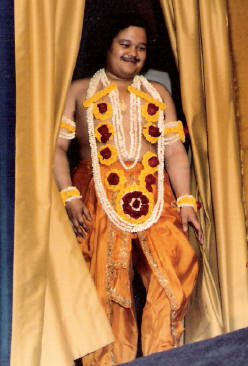Denials of Belief
It has been a consistent contention of Prem Rawat and his followers that what Rawat teaches has nothing to do with 'belief' that it is wholly 'experiential'. Despite this claim of 'no belief', prior to initiation anyone seeking to be taught the Knowledge meditation techniques must adopt many beliefs about Prem Rawat in order to negotiate the 'aspirant' process that Rawat calls 'The Keys'. The Keys are only part of a very comprehensive belief system which exists throughout the Prem Rawat movement, although outside of Prem Rawat's often contradictory speeches, it has no supporting liturgy, prescribed text or publicly acknowledged historical reference but has a large body of concepts that Rawat has repeatedly mentioned in his speeches.
To become a follower of Prem Rawat, it is necessary to hold two incontrovertible beliefs.
The first belief is that each individual has an 'inner world' which is a source of secret reward. Prem Rawat most frequently refers to this 'inner world' as "your heart", by which he means not the emotional centre of a person, but rather an ill defined mystical reality.
The second belief is that Prem Rawat uniquely, has the power to take the individual to that "inner world" and that it is impossible for a person to find their "heart" unaided by Prem Rawat.
The message contained within these two core beliefs can be summarised as: The essence of your own humanity lies within yourself (the "heart") but that you are blocked from touching that "heart" by the everyday chatter and uncontrolled thoughts and feelings that swirl about inside you. Prem Rawat refers to this chatter as "the mind" and "the "doubt maker" and often infers a Manichean malignity to it.
To overcome this 'block' to your 'inner world', to be able to "find your heart", Prem Rawat prescribes a long process called the Keys (Since 2004 watching 70 hours of videos of him talking, since 2014 less than 8 hours). Quite a remarkable improvement in efficiency. There is then a meeting at which the secret techniques are revealed. From then on there are daily one hour personal and private meditation sessions. He calls this system Knowledge, or Self Knowledge and frequent times of "keeping in touch" either by listening to him speak in person at 'events' or videos of him speaking at these events is needed to keep the inspiration and gratitude flowing. All contact is through the internet. No personal contact with others following these guidelines is required. The meditation is described under the Four Techniques.
Once an individual has adopted these basic beliefs and lifestyle they may further adopt a series of consequent beliefs which can be characterised as Rawatism. Predominant amongst the beliefs of Rawatism is the doctrine of 'the master is always needed'. This belief follows from the "mind" problem where the follower finds that even the Rawat meditation is inadequate to the task of permanently stilling conscious thought and that only listening to the words of the master (Prem Rawat), provides the impetus to reach the "peace" of one's "heart".
Although the religious practices that once supported the Rawat belief system have been excised from public presentation, most, if not all, of Prem Rawat's remaining followers continue to pursue a devotional attachment to Rawat in private which he now calls 'gratitude'. Organisations which promote Prem Rawat sell 'inspirational' photographs of Prem Rawat as well as recorded music which is'devotional' in style. The use of pictures of Prem Rawat as 'altar pieces' and the playing of devotional style songs as a liturgy still is a current practice among Rawat's followers. In addition many followers continue to rely on the 'history' of the transference of 'guruship' to Prem Rawat from his father as an explanation of Prem Rawat's special status.
Prem Rawat's followers maintain that they follow no belief system whatsoever, that theirs is a wholly empirical approach based on the truth of the experience of meditation and, although this is less frequently specified, the experience of Prem Rawat's presence and words. Thus when asked what do you believe? a Rawat follower may well answer that they do not believe in Prem Rawat or his 'Knowledge' but rather that "they Know".


